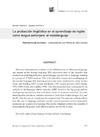Please use this identifier to cite or link to this item:
https://accedacris.ulpgc.es/jspui/handle/10553/11204
| Title: | La producción lingüística en el aprendizaje de inglés como lengua extranjera: el metalenguaje | Other Titles: | The linguistic production in the learning of English as foreign language: metalanguage | Authors: | Arnaiz Castro, Patricia | UNESCO Clasification: | 570107 Lengua y literatura 550510 Filología |
Keywords: | Output Foreign language learning Feedback Metalanguage |
Issue Date: | 2012 | Journal: | LFE. Revista de Lenguas para Fines Específicos | Abstract: | This case study presents evidence of the different ways in which metalanguage can appear in the foreign language (FL) classroom and of the benefits that interactions including reflection upon language can provide to language learning in a group of 4º ESO students. The roles played by output and metalanguage in the second language (L2) learning process has been examined by many studies (Gass and Mackey, 2007; Lyster and Ranta, 1997; Lyster & Saito, 2010; Swain, 1995, 2000; Swain and Lapkin, 1998). The data presented here correspond to an analysis of the language related episodes (LRE) found in the big group and the small group interactions that took place in the 21 sessions observed. To solve their linguistic problems, students resorted to both their mother tongue (L1) and the FL with the aim of completing the assigned task. The episodes collected show how the use of language activates certain mental processes and consequently represents an occasion for learning. The results obtained confirm the benefits of increasing the frequency with which students use the FL in class. | URI: | https://accedacris.ulpgc.es/handle/10553/11204 | ISSN: | 1133-1127 | Source: | LFE. Revista de lenguas para fines específicos [1133-1127], n. 18, 2012, p. 157-182 |
| Appears in Collections: | LFE, Rev. leng. fines específ. n.18, 2012 Artículos |
Page view(s) 1
26,949
checked on Jan 16, 2026
Download(s)
849
checked on Jan 16, 2026
Google ScholarTM
Check
Share
Export metadata
Items in accedaCRIS are protected by copyright, with all rights reserved, unless otherwise indicated.
